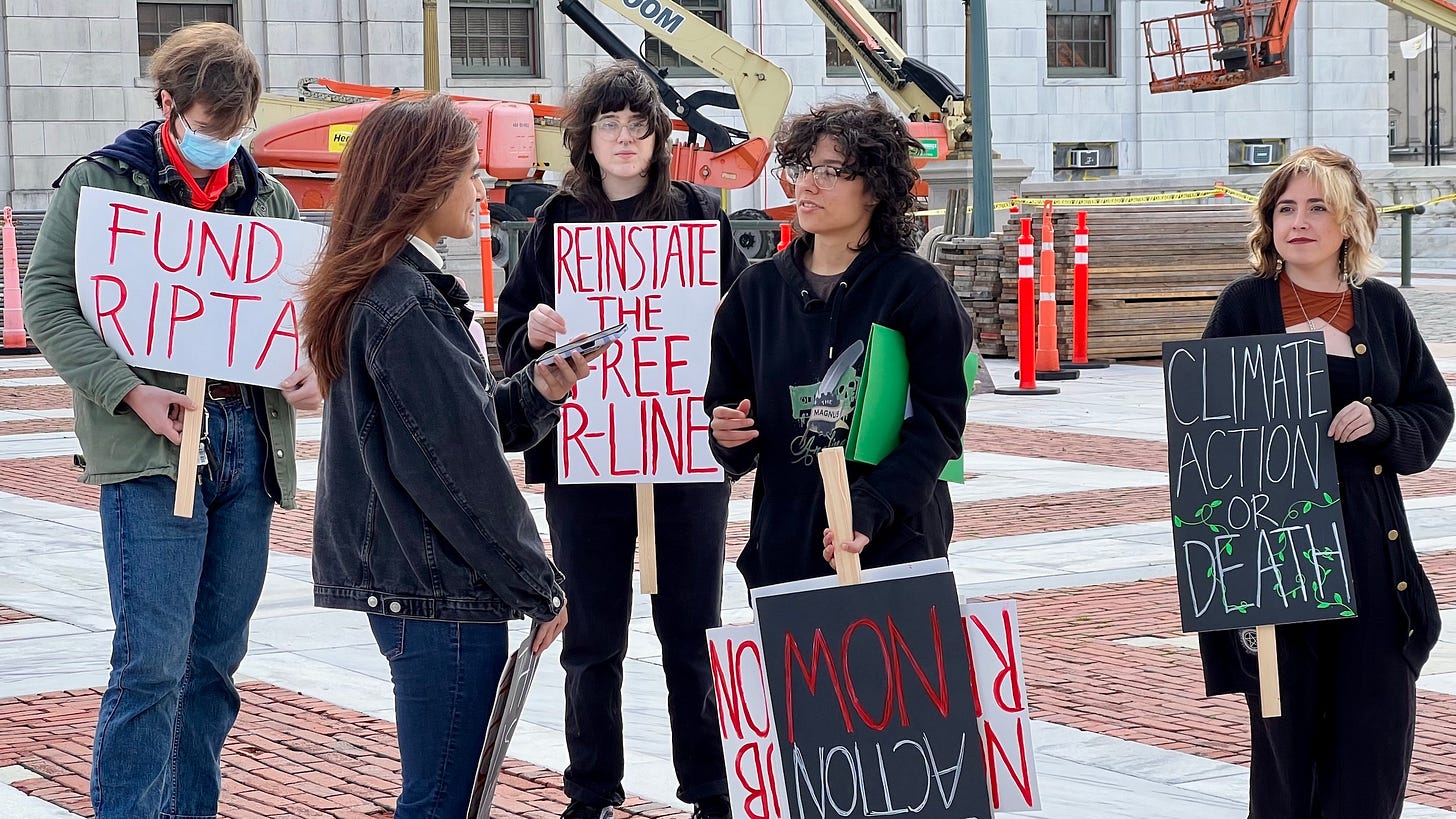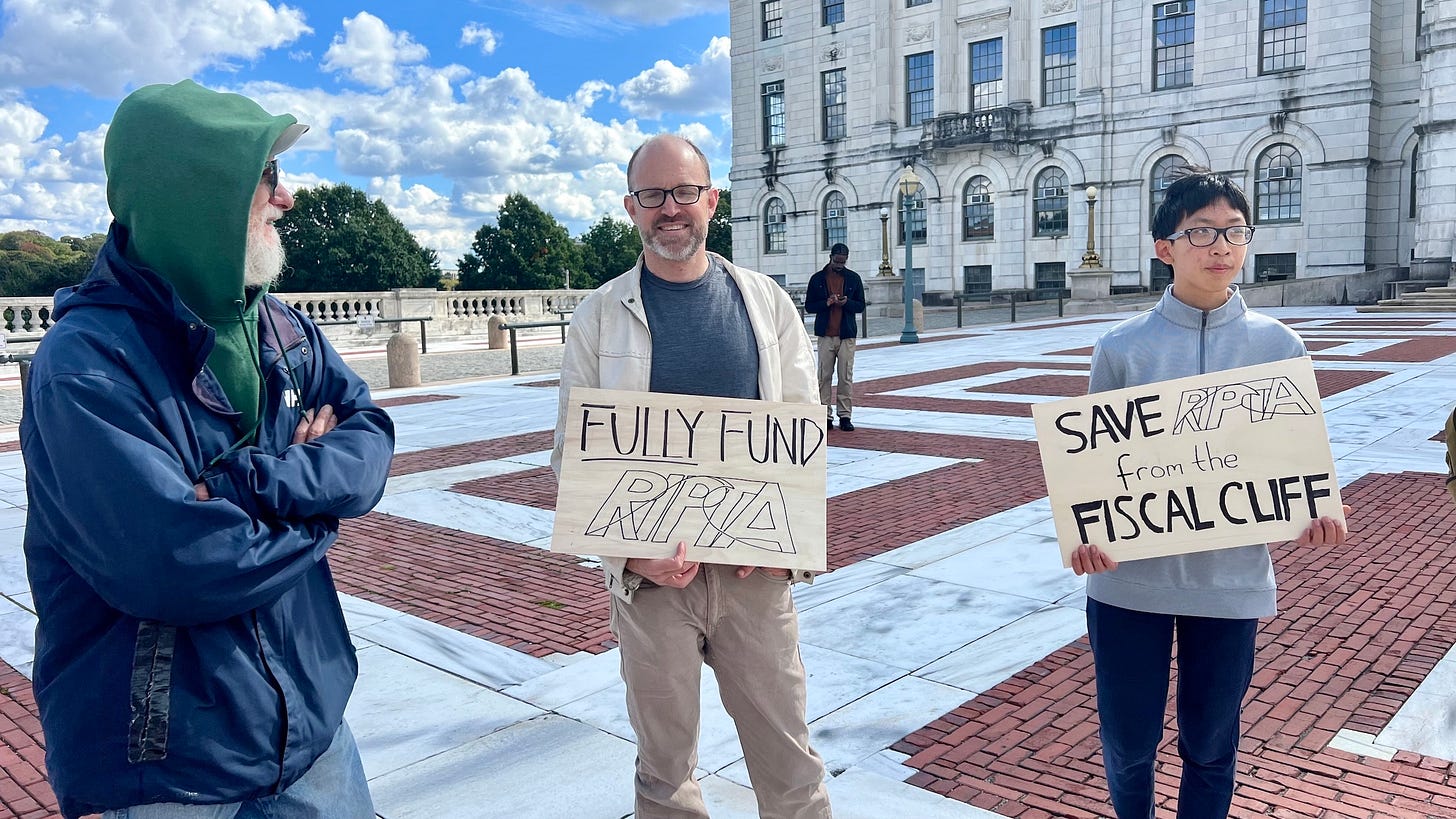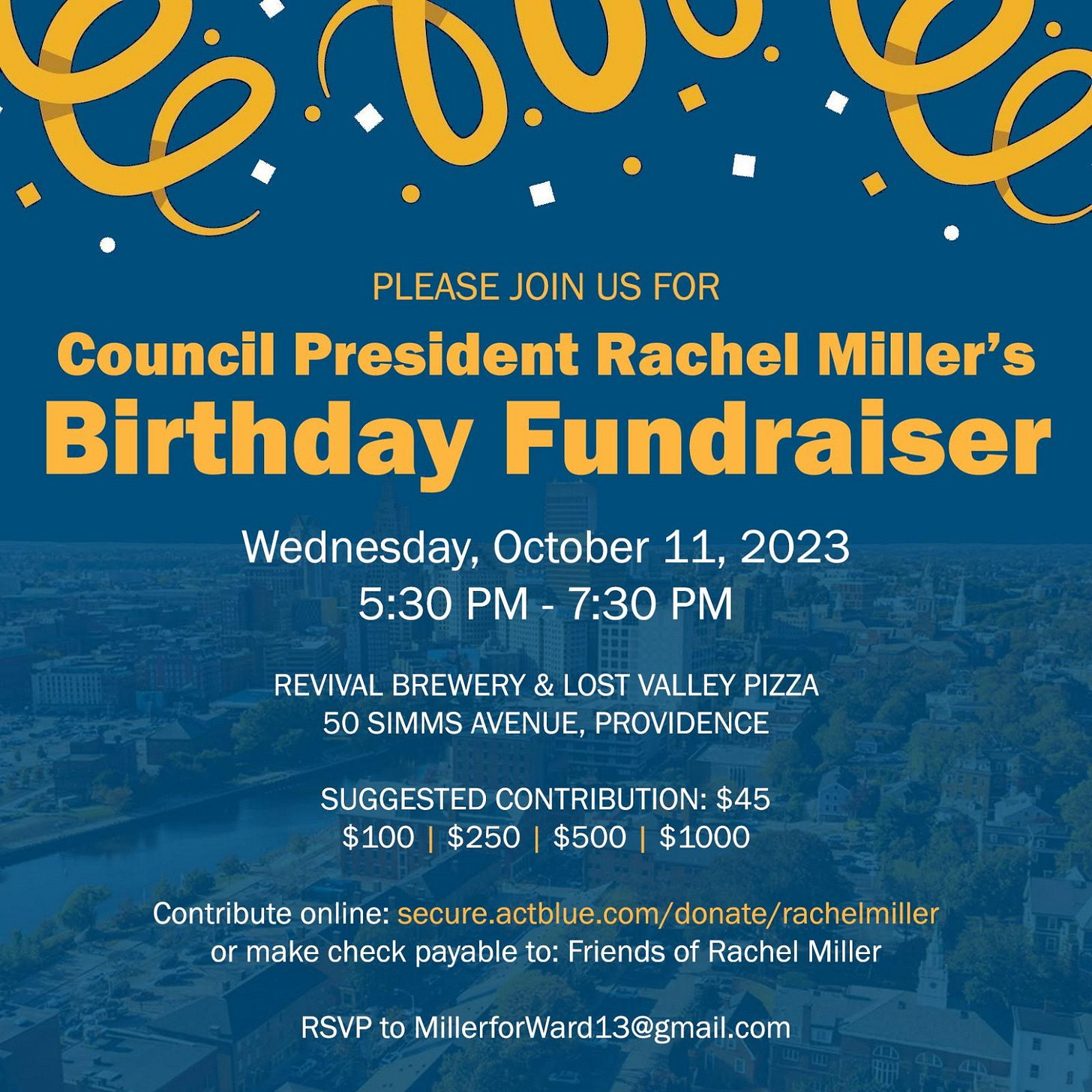RIPTA needs saving. Will our elected leaders act?
"Next year in 2024, RIPTA will be left with a fiscal cliff of $33 million, quickly exceeding $40 million in following years..."
It was a chilly Monday on Smith Hill as over two dozen people gathered at the Rhode Island State House to march to the bus hub in Kennedy Plaza. Organizer Dally Dixon held the rally to call attention to several problems facing the Rhode Island Public Transit Authority (RIPTA) the state agency tasked with running our bus service. Dixon also spoke about missed opportunities, like the end of RIPTA's extremely successful free R-Line pilot program.
Activists are demanding:
Increased state and federal funding
Reinstated free R-Line
Better pay for bus operators
Preventing the fiscal cliff
You can watch the speaking program here:
“Pre-COVID, RIPTA was funded by state gas taxes, fare revenue, and some additional state funds,” said Dally. “However, Rhode Island state and local contributions are significantly less per capita than other states. When the pandemic hit in 2020, fare revenue decreased leaving transit agencies in jeopardy. nationwide. The federal government gave emergency relief funding to RIPTA to fill the gap. This money will soon run out before full ridership recovery, resulting in critical budget shortfalls for transit systems nationwide. Next year in 2024, RIPTA will be left with a fiscal cliff of $33 million, quickly exceeding $40 million in following years.
“There is no federal solution and action on the state level is required. RIPTA's operating expenses are projected to increase due to inflation while gas tax revenue will decrease as more Rhode Islanders switch to electric vehicles. As a result, the budget gap will continue to increase and RIPTA will need a sustainable long-term funding source. Left unaddressed, the fiscal cliff will result in catastrophic service cuts, reducing our ability to move around the state. Service cuts mean fewer people will ride the bus, less money will be collected in fares, and more service will be cut. RIPTA gives tens of thousands of people access to Rhode Island's crucial services, jobs, and opportunities.
“Transit is an economic engine for our state and a key part of the solution to climate change,” continued Dally. “Letting transit die would be extremely detrimental to our state's equity, economic, and environmental goals. We are calling upon our elected leaders, two of whom we are fortunate to have with us here today, to fully fund RIPTA. We are calling upon Rhode Island Governor Daniel McKee, Senate President Dominic Ruggiero, House Speaker Joseph Shekarchi, as well as our senators and representatives. All of us are here today because Rhode Island needs public transit.”
“I represent Rhode Island transit riders and we have two major goals. One of them is to fund the fiscal cliff. The second is to fund the transit master plan,” said Patricia Raub. “What would service cuts mean?
“It would mean that RIPTA would be forced to end all Sunday service and holiday service like today, how would some of us have gotten here? All summer beach bus service essential workers with Sunday jobs would have to take lifts or many families who have enjoyed the summer out and the beaches would have to explain to their children why they could no longer go...
“RIPTA needs additional funding to implement the Transit Master Plan,” continued Raub. “If the state is going to reach its act on climate goals, we need to entice those people with cars to take the bus either all the time or at least for some of their trips. This means implementing the Transit master plan, which can achieve 80% of the 2050 target for vehicle miles traveled productions. Not only is it good for the environment, but it will also make the lives of riders better, faster, and more user-friendly.”
Senator Meghan Kallman (Democrat, District 15, Pawtucket) was the driving force behind the free R-Line pilot program in the State Senate, which ended October 1st. [Representative Leonela Felix (Democrat, District 61, Pawtucket) led the effort in the House.]
“As everybody here knows," said Senator Kallman, the Free R-Line pilot program “has been a huge success and we need more of it. What the state didn't do was give quite enough money to make up for the fare difference, but we got an idea through this pilot what transit could look like if we made it easy for people instead of incredibly difficult for people [to use]...
“What we are seeing over and over, here and elsewhere, like in Boston, where they're also piloting free fare lines is that those free fare arrangements do a tremendous amount to boost ridership. It means that people who weren't previously riding the bus or people who were riding the bus less frequently because it was expensive, are riding it more. Either one is a good outcome in my view. The data is coming in, it's coming in consistently that these sorts of projects do a huge amount to connect cities.
“It also doesn't cost the state very much money in the grand scheme of what we spend,” noted Senator Kallman. “We put money, as a state, into highways and streets because we see them as a public good. They are indeed a public good. But you know what else is a public good? Public transit. The best transit systems worldwide do not expect to be turning a profit on their fares. If you look at Tokyo, or you look at Madrid, the expectation is not that it's making money. The expectation is that states and communities support these pieces of infrastructure because they make life better for all of us who live within those communities.”
“[The R-Line] is the main transportation line from Providence to Pawtucket. It is probably one of the most frequently used buses with one of the most frequent bus stops. It is that critical,” said Alexandrea Gonzalez. “Allowing the R-Line to be free has had a positive impact on all of the bus riders that it serves.
“There are many restaurants, small businesses, schools, and services that are on this main route. And it has allowed those economically disadvantaged and others who are just trying to go to work to save money to be able to focus on housing, education, employment, and much more...
“The free R-Line allows people access to basic needs, food, health care, and banking. It is an essential public service to provide equitable access to the city.”
Additional speakers:
Robert Kells is a RIPTA Board member.
Terri Wright from Direct Action for Rights and Equality (DARE)
Randall Rose spoke about the ongoing effort and escalating costs of moving the bus hub out of Kennedy Plaza.
Christian Roseland, Providence Urbanist Network
After the speaking program, the small crowd marched to Kennedy Plaza.
Note: The above is a paid advertisement. Every penny made is poured back into my reporting. Let me know your thoughts about such advertisements in the comments!









